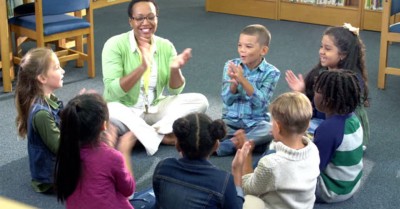Music in varied forms offers a plethora of benefits to children, whether they are listening to or making it themselves. The following article provides the benefits of singing to children.
It Introduces Language
Singing is one of the most enjoyable ways of introducing language to children even before they can speak. When caregivers sing to babies and toddlers, the little ones listen to and start identifying not just sounds and specific sound patterns but also rhythms and rhymes. Eventually, they learn to identify these in words and expressions. Through singing then a child’s language comprehension begins.
It Builds Vocabulary
As Educators sing to children, they help the young ones acquire new words and phrases along with their meanings. For example, if you sing about a stuffed teddy to a child, they learn to associate the name of that toy, the kind of animal it is, how it looks and pretend feels with the words you sing. Likewise, songs about parts of the body can get children to identify and name them, thereby expanding their vocabulary.
It fosters foundational literacy skills - Over time, as singing helps children acquire language and enlarge vocabulary, it puts in place skills that later support literacy activities like reading and writing.
It Soothes Children
Cultures all over the world have their own lullabies. These simple melodies help babies and young children sleep or calm down. Even older children with anxieties may find it soothing to listen to soft music.
It Promotes Communication
Like reading, singing is an activity that requires listening. Thus by being sung to, children learn that sounds, gestures and vocalizations can be used to express one’s thoughts and feelings.
It Is One Form Of Play
Singing is a fun way to engage children in play. Caregivers and educators can make it active and interactional by singing together, turn-taking and accompanying the singing with lots of movements.
It Nurtures Social Interaction
When caregivers or educators sing what children like, it is rare for the young ones not to respond in some way. Thus singing helps children learn social skills like how to invite peers to play, and respond to overtures from others. Above all, a collective singing choir or small group generates a positive group identity, as well as a sense of social inclusion and belonging.
It Encourages Children To Sing
Singing to children encourages children to join as well. There is a huge body of research2 on how singing benefits children, ranging from improving respiratory, cardiac and brain function to enhanced language learning, social skills and emotional expressions.
Further Reading
The Importance Of Nursery Rhymes For Children - The following article provides information on the Importance Of Nursery Rhymes, the Key Benefits and Strategies To Implement Nursery Rhymes.
Benefits Of Music and Movement - The following article is suggested learning objectives that support a child's overall development in music and movement.
References:
10 Ways Babies Learn To Sing To Them, NAEYC
The Benefits Of Singing To Children, Institute Of Education, University Of London







 Open ended questions cannot be responded to with one word answers such as yes or no. These types of questions enables a child to provide
Open ended questions cannot be responded to with one word answers such as yes or no. These types of questions enables a child to provide During your child’s preschool years, an important milestone begins to emerge. This is the development of pre-writing skills. Pre-writing skills are used to encourage, develop
During your child’s preschool years, an important milestone begins to emerge. This is the development of pre-writing skills. Pre-writing skills are used to encourage, develop Open ended materials enables children to play freely. They are objects that have no rules to follow, use or function. Raw materials that can be
Open ended materials enables children to play freely. They are objects that have no rules to follow, use or function. Raw materials that can be An Acknowledgment of the Country is a way of showing respect for the Traditional Owners and can be given by both non-Indigenous people and Aboriginal
An Acknowledgment of the Country is a way of showing respect for the Traditional Owners and can be given by both non-Indigenous people and Aboriginal Language plays an important role in a child’s development. It enables a child to communicate effectively with their family, learn at school, socialize with friends,
Language plays an important role in a child’s development. It enables a child to communicate effectively with their family, learn at school, socialize with friends, Like adults, children have to deal with their own stress in life. Moving house, starting a new school, preparing for a new sibling - these are
Like adults, children have to deal with their own stress in life. Moving house, starting a new school, preparing for a new sibling - these are Playdough is such a versatile material. It provides numerous benefits to children as they manipulate it, it is safe and soothing and provides children with
Playdough is such a versatile material. It provides numerous benefits to children as they manipulate it, it is safe and soothing and provides children with Teaching children about sustainability enables them to appreciate and respect the natural environment. Early childhood services can provide meaningful hand on learning experiences in order
Teaching children about sustainability enables them to appreciate and respect the natural environment. Early childhood services can provide meaningful hand on learning experiences in order Recycling is an important concept that teaches children to care for the environment. It encourages children to be responsible and show a growing appreciating for
Recycling is an important concept that teaches children to care for the environment. It encourages children to be responsible and show a growing appreciating for When children apply paint to paper, glue things together, or pound a lump of clay, they experiment with colour, shape design and texture.
When children apply paint to paper, glue things together, or pound a lump of clay, they experiment with colour, shape design and texture.



